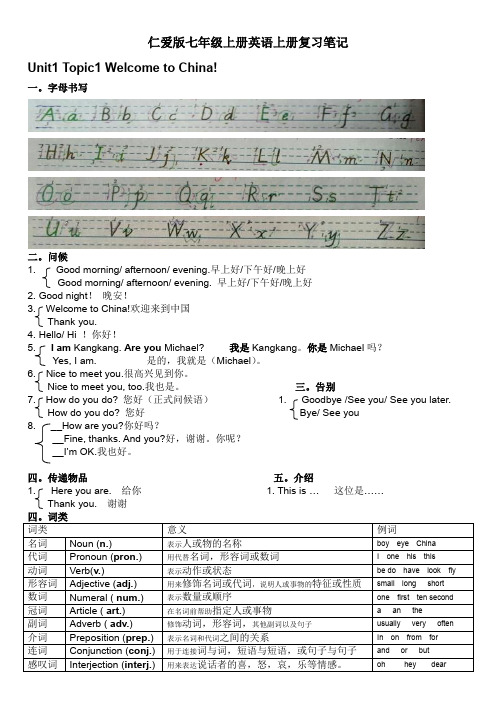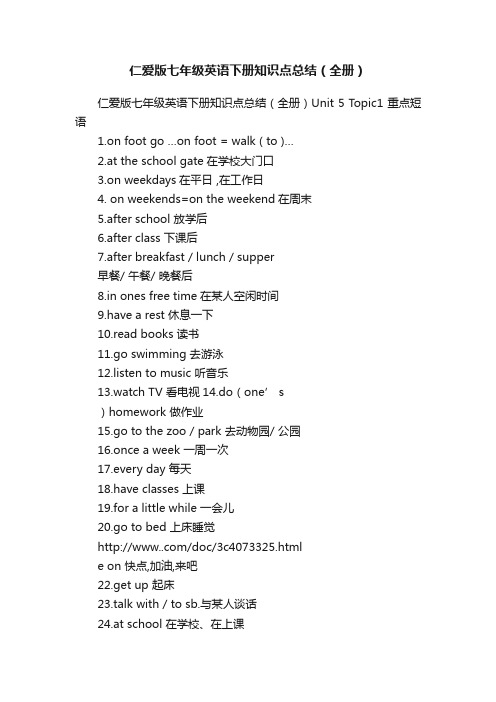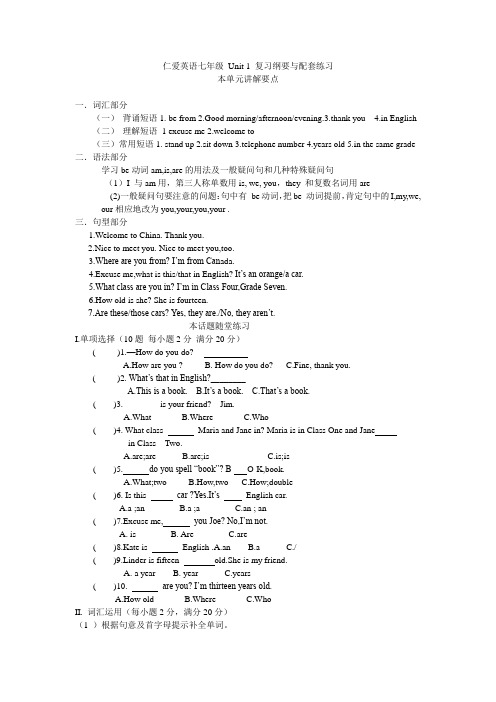仁爱版七年级英语全册复习笔记(201X版)
仁爱版七年级上册英语全册复习笔记

仁爱版七年级上册英语上册复习笔记Unit1 Topic1 Welcome to China!一。
字母书写二。
问候1. Good morning/ afternoon/ evening.早上好/下午好/晚上好Good morning/ afternoon/ evening. 早上好/下午好/晚上好2. Good night!晚安!3. Welcome to China!欢迎来到中国Thank you.4. Hello/ Hi !你好!5. I am Kangkang. Are you Michael? 我是Kangkang。
你是Michael吗?Yes, I am. 是的,我就是(Michael)。
6. Nice to meet you.很高兴见到你。
Nice to meet you, too.我也是。
三。
告别7. How do you do? 您好(正式问候语) 1. Goodbye /See you/ See you later.How do you do? 您好Bye/ See you8. __How are you?你好吗?__Fine, thanks. And you?好,谢谢。
你呢?__I’m OK.我也好。
四。
传递物品五。
介绍1. Here you are. 给你 1. This is …这位是……Thank you.谢谢四。
词类词类意义例词名词Noun (n.) 表示人或物的名称boy eye China代词Pronoun (pron.) 用代替名词,形容词或数词I one his this动词Verb(v.) 表示动作或状态be do have look fly 形容词Adjective (adj.) 用来修饰名词或代词,说明人或事物的特征或性质small long short数词Numeral ( num.) 表示数量或顺序one first ten second 冠词Article ( art.) 在名词前帮助指定人或事物 a an the副词Adverb ( adv.) 修饰动词,形容词,其他副词以及句子usually very often 介词Preposition (prep.) 表示名词和代词之间的关系In on from for连词Conjunction (conj.) 用于连接词与词,短语与短语,或句子与句子and or but感叹词Interjection (interj.) 用来表达说话者的喜,怒,哀,乐等情感。
仁爱版七年级上册英语全册知识点总结

考点一 thank的用法 【课文原句】 Thank you. 谢谢你。(七上P1) thank常用在日常交际中,表示对对方的感激之情。其常用 句型为thank sb. for (doing) sth.“因(做)某事而感谢某人”, 相当于“thanks for (doing) sth.”。
单项选择 4.(2019·预测)—Hello, this is Tina speaking. Is that Sam? —Sorry, he isn't here at this moment. _A__? A.Can I take a message B.What are you saying to Tina C.May I speak to Sam D.What's that speaking
【拓展】
词汇 helpful helpless
含义
用法
有帮助的;有用的
be helpful to...“对……有用 ”
feel helpless“感到无能为力 无助的;无法抑制的
”
用适当的介词填空 13.Bill has made great progress _w__it_h_ the help of his teacher.
单项选择
7.(2018·安徽中考)—Will you go to the picnic this Saturday?
—I'd like to, _A__ I'll have to help look after my baby sister.
A.but
B.or
C.and
D.so
8.(2018·湖北襄阳中考)—Be quick, _C__ we'll fail to catch
仁爱版七年级英语下册知识点总结(全册)

仁爱版七年级英语下册知识点总结(全册)仁爱版七年级英语下册知识点总结(全册)Unit 5 Topic1 重点短语1.on foot go …on foot = walk ( to )…2.at the school gate在学校大门口3.on weekdays在平日 ,在工作日4. on weekends=on the weekend在周末5.after school 放学后6.after class 下课后7.after breakfast / lunch / supper早餐/ 午餐/ 晚餐后8.in ones free time在某人空闲时间9.have a rest 休息一下10.read books 读书11.go swimming 去游泳12.listen to music 听音乐13.watch TV 看电视14.do(one’s)homework 做作业15.go to the zoo / park 去动物园/ 公园16.once a week 一周一次17.every day 每天18.have classes 上课19.for a little while 一会儿20.go to bed 上床睡觉/doc/3c4073325.htmle on 快点,加油,来吧22.get up 起床23.talk with / to sb.与某人谈话24.at school 在学校、在上课25.go to school 去上学26.and so on ……等等重点句型1.Happy New Year! The same to you.2.Your new bike looks very nice. Thank you.2.How do you usually come to school? —I usually come to school by subway.3.How often do you go to the library? —Once/Twice/Three times a week/Very often/Every day/Sedom4.The early bird catches the work. (谚语) 笨鸟先飞5.Classes begin at eight. =Class begins at eight. What time does the class begin? / What time do theclasses begin?6.We have no more time. 我们没有更多的时间了。
七年级英语仁爱全册知识点

七年级英语仁爱全册知识点随着教育体制的改革,学生的英语学习从小学提前至中学。
作为初中的入门课程,七年级英语仁爱全册是一个关键的学习阶段。
本文将为大家介绍七年级英语仁爱全册中的重点知识点。
一、基础语法1.动词动词是句子中最重要的词性之一,表达行为和状态。
七年级英语仁爱全册中,我们需要掌握常用的动词时态、语态、情态动词等,以及常见的不规则动词的变化规律。
2.名词名词是句子中最基本的词性之一,用于描述人、事、物、地点等一切事物的名称。
在学习英语时,我们需要学会使用单数名词、复数名词、可数名词和不可数名词等。
3.形容词和副词形容词和副词是用来描述名词和动词的一种词性。
在七年级英语仁爱全册中,我们需要学会形容词和副词的用法,包括比较级和最高级,以及其在句子中的位置和修饰的对象等。
二、重点话题1.家庭和朋友在这个话题下,我们需要掌握常用的家庭成员和亲戚的称呼,家庭成员之间的关系,以及描述朋友和交谈的常用语句等。
2.学校生活和活动学校生活是每个学生都需要经历的。
在学习七年级英语仁爱全册时,我们需要掌握与学校生活和活动相关的词汇,比如教师、课程、考试、班级、活动等,以及能够表达自己在学校中的想法和感受。
3.旅游和文化旅游和文化是人们日常生活中的重要组成部分。
在这个话题下,我们需要学会与旅行和文化相关的词汇,包括景点、城市、文化遗产、美食等,以及能够用英语描述旅行经历和文化感受。
三、听力和阅读理解七年级英语仁爱全册中有大量的听力和阅读理解内容。
通过听读练习,我们可以提高自己的语感和理解能力,同时巩固所学的词汇和语法。
我们需要练习听取和理解不同语速、口音和语调的人说话,以及阅读不同难度和风格的文章。
综上所述,七年级英语仁爱全册中的知识点是广泛而丰富的。
通过认真学习和练习,我们可以提高自己的语言能力和技能,为今后的学习和工作打下坚实的基础。
仁爱版英语七年级上册笔记(手打非常详细)

七年级上册Unit 11.介绍:this is+姓名2.how are you?Fine/I’m fine./Iam ok.Very willJust so so3.be from=come from 来自4.in+语言=用某种语言5.Let sb do sth 让某人做某事6. How old 年龄What class 班级What grade 年级How 怎样Unit 27.主语为第三人称单数时用has,其余人称都用have8.Look the same=look like 看起来很像9.Different+名词单数10.A pair of 一双,一对11.-Whatcolor be these/thoes/this/that+名复?-There be+颜色12.look at 看着13In+a/an+颜色+名单(服装)=in+颜色14.形容词性物主代词+名词=名物15.主格I you he she it they we 宾格me you him her it their us 形物+名my your his her its their our 形物mine yours his hers its theirs ours 16.help sb do sth 帮助某人做某事Unit317.Could you plesase+动词原形? 你可以...吗?18.Sure=No problem=Of course19. Talk 谈话Tell 语言Say 说的内容Speak 讲一国语言/接电话的人是谁20.Can+形态动词能够,可以21. Not at all 没关系Not...at all 一点儿也不22.help each other 互相帮助23. Like....a lot 许多Like....very much 非常喜欢Like 喜欢Like... a little 一点点喜欢Don’t/Doesn’t like 不喜欢Don’t/Doesn’t like...at all 一点也不喜欢24.-what does/do sb do?=what be sb?=what’s sb’s job?-Sb is an/a +职业名词单数25.I am home 我到家了26.What about doing sth? 做什么怎么样呢?27. Like doing sth(一直喜欢)突然喜欢)28.have...for breakfast/lunch/dinner 吃/早/中/晚29.Favorite=like...best30.Take one’s order 记下某人点的饭菜31.Have dinner/breakfast/lunch with sb32.Why not do sht?=why dont you....? 表建议33.Have to do sth 不得不做某事Unit 434.buy sth for sb=buy sb sth35.What can i do for you?=May i help you?36.Try on 试穿37.On 在...上面/穿,戴38.Give sth to sb=give sb sth39.How do you like...?=what do you think of...? 你觉得...怎么样?40. Look for 强调过程Find 强调结果41.do some shopping=go shopping42.How much+不可名+一般疑问句(be动词,助动词,形态动词)? How many +可名复+一般疑问句(be动词,助动词,形态动词)?43.be free 有空44.Have to do sth 不得不做某事(强调客观的状况)45.Must be 必须46.Fly a kite 放风筝47.I have no time=I don’t have any time 没时间48.At the beginning of 在....开始49.At the end of在...的结束50.Have a picnic= go for a picnic 去野餐51.Do one’s homework 做某人的作业52.Go wit sb 和某人一起去53.在时刻前用介词at54.It’s time to do sth=It’s time for sth 是时候做某事了55.①整点用o’clock②1-30分用past③31-59分用to④15和45分用quarter56.thank you for doing sth/sb help谢谢做某事/某人的帮忙57.It’s very kind of you 你真好!(表达感谢的方式)58.On one’s way to somewhere (PS:home前不加to)。
(仁爱版)七年级英语总复习Unit 1知识点、练习和参考答案

仁爱英语七年级Unit 1 复习纲要与配套练习本单元讲解要点一.词汇部分(一)背诵短语1. be from 2.Good morning/afternoon/evening.3.thank you 4.in English (二)理解短语 1 excuse me 2.welcome to(三)常用短语1. stand up 2.sit down 3.telephone number 4.years old 5.in the same grade 二.语法部分学习be动词am,is,are的用法及一般疑问句和几种特殊疑问句(1)I 与am用,第三人称单数用is, we, you,they 和复数名词用are(2)一般疑问句要注意的问题:句中有be动词,把be 动词提前,肯定句中的I,my,we,our相应地改为you,your,you,your .三.句型部分1.Welcome to China. Thank you.2.Nice to meet you. Nice to meet you,too.3.Where are you from? I’m from Can ada.4.Excuse me,what is this/that in English? It’s an orange/a car.5.What class are you in? I’m in Class Four,Grade Seven.6.How old is she? She is fourteen.7.Are these/those cars? Yes, they are./No, they aren’t.本话题随堂练习I.单项选择(10题每小题2分满分20分)( )1.—How do you do?--A.How are you ?B. How do you do?C.Fine, thank you.( )2. What’s that in English?________A.This is a book.B.It’s a book.C.That’s a book.( )3. ________is your friend? Jim.A.WhatB.WhereC.Who( )4. What class Maria and Jane in? Maria is in Class One and Janein Class Two.A.are;areB.are;isC.is;is( )5. do you spell “book”? B- O-K,book.A.What;twoB.How,twoC.How;double( )6. Is this car ?Yes.It’s English car.A.a ;anB.a ;aC.an ; an( )7.Excuse me, you Joe? No,I’m not.A. isB. AreC.are( )8.Kate is English .A.an B.a C./( )9.Linder is fifteen old.She is my friend.A. a yearB. yearC.years( )10. are you? I’m thirteen years old.A.How oldB.WhereC.WhoII. 词汇运用(每小题2分,满分20分)(1 )根据句意及首字母提示补全单词。
仁爱版英语七年级下册知识点复习归纳(完整版)
仁爱版英语七年级下册知识点复习归纳(完整版)Ren'ai English Grade 7 Unit 5 Topic 1 ReviewKey Grammar: Present Simple Tense (often used with adverbs of frequency such as never。
seldom。
sometimes。
often。
usually。
always)Key XXX:How do you usually come to school?I usually come to school by subway.How often do you go to the library?XXX/Three times a week/Very often/Every day/SeldomXXX:1.I always come to school by bus。
"By" is used with the name of a n method。
without any articles in een。
If there is an article such as "a," "the," or "my" in front of the n method。
"in" or "on" should be used instead。
For example。
"on the train" is the same as "by train," "on his bike" is the same as "by bike," and "inmy car" is the same as "by car." To distinguish een "on foot" and "walk," "on foot" means "walking" XXX but only as an adverb of manner at the end of a sentence。
仁爱版英语书知识点笔记七年级
仁爱版英语书知识点笔记七年级一、Unit 1 My School1. 学校设施school facilities例句:Our school has a library, a computer room, a playground, and a canteen.2. 地点介绍introducing a place例句:This is the playground. We usually play football and basketball here.3. 时间介绍introducing time例句:In the morning, we have four lessons. In the afternoon, we have two lessons.4. 数字表达expressing numbers例句:My phone number is 123456789, and I live on the 5th floor.5. 介绍家庭成员introducing family members例句:My grandfather and grandmother live in the countryside. I have a brother and a sister.二、Unit 2 My Day1. 时间表达expressing time例句:I usually get up at six o'clock. I have breakfast at seveno'clock. I go to school at eight o'clock.2. 日常活动daily activities例句:I brush my teeth in the morning. I eat lunch at school. I watch TV in the evening.3. 介绍日常活动introducing daily activities例句:I usually do my homework after school. Sometimes, I play video games with my friends.4. 表达频率expressing frequency例句:I always go to bed at ten o'clock. I never eat junk food.5. 固定时间表达expressing fixed time例句:On Mondays, I have music class at nine o'clock. On Wednesdays, I have art class at ten o'clock.三、Unit 3 My Weekend1. 过去时态past tense例句:Yesterday, I went to the park with my family. We had a great time.2. 句型变换sentence transformation例句:I usually play basketball on weekends.(改为否定句)I don't usually play basketball on weekends.3. 日程规划planning a schedule例句:I am going to the museum next Saturday. I am going to study for the math test on Sunday.4. 表达想法expressing ideas例句:I think going to the beach is a good idea. I don't like camping because I am afraid of bugs.5. 进一步的计划further plans例句:Next weekend, I am going to visit my grandparents. We are going to have a family dinner on Sunday.四、Unit 4 My Home1. 房屋设施house facilities例句:We have a big living room, a kitchen, and three bedrooms in our house.2. 家居生活home life例句:I clean my room every week. My mother cooks dinner every night.3. 家庭聚会family gathering例句:We usually have a big family dinner on Chinese New Year's Eve. We all wear new clothes and eat delicious food.4. 表达位置expressing location例句:My room is next to the bathroom. The kitchen is on the first floor.5. 饰品家具decorations and furniture例句:We have a big sofa and a small coffee table in the living room. There are some photos on the wall.五、Unit 5 My Food1. 食物种类types of food例句:I like Chinese food, such as dumplings and fried rice. I also like pizza and pasta.2. 食物制作preparing food例句:I can make a sandwich for breakfast. I usually put ham, cheese, and lettuce in it.3. 餐馆经验restaurant experiences例句:I went to a Japanese restaurant last week. I ordered sushi and tempura. They were delicious.4. 健康饮食healthy eating例句:I try to eat more fruits and vegetables every day. I also drink a lot of water.5. 食物介绍introducing food例句:This is a bowl of noodles. They are made of flour and water. They are very popular in China.以上就是仁爱版英语书知识点笔记七年级的内容概述,通过对本篇文章的全面了解,相信你可以更好地掌握这些知识点,为英语的进一步学习打下坚实的基础。
仁爱版七年级下册英语复习知识点
仁爱版七年级下册英语复习知识点仁爱版七年级下册英语复习知识1重点语法There be句型Wh-questions重点句型What’s your home like? What’s the matter?Sorry, I can’t hear you. I’ll get someone to check it right now.There is something wrong with mykitchen fan.重点讲解1 house with three bedrooms.有三间卧室的房子。
with “有,带有”。
with还可以意为“和(某人/某物)在一起”2 apartment for a family of two.适合两口之家的公寓。
(1) for表示“给……”表示目的或功能。
后接物主代词或名词,但通常带’s.或者后接表示无生命物体的名词。
Here is a letter foryou.(2)of的含义为“属于某人/某事物”。
She is a friend of Lily’s. = She is Lily’s friend.3 What’s the matter?怎么了?该句常用来询问某或某物出了什么什么问题或毛病;询问具体某人或某物出了什么问题时,还可以表达为:What’s the matter with sb./sth.某人或某物出了什么毛病。
What’s the matter? = What’swrong?4 Ihear you playing the piano.我听见你在弹钢琴。
hear…doing sth.“听见……在做某事”,强调正在进行的动作。
hear…dosth.“听见……做了某事”,强调全过程。
hearabout sth.听到关于某事物的消息 hear from sb.接到某人的来信、电话等hear of sb./sth.听到或知道某人或某事物的情况5 a lot of = lots of许多后接可数名词,相当于many;后接不可数名词,相当于much,用于肯定句中;但是注意:如果是否定句,则常用many或much.6 be far from… 离……远(抽象距离)be…away from…离……远(具体距离)My school is not far from thebookstore. The sea is 2 miles away fromthe hotel.7 There is something wrong with sb./sth.某人或某物出问题/有毛病了。
仁爱版七年级英语全册复习笔记
仁爱版七年级英语上册复习笔记Unit1 Topic1 Welcome to China!一。
字母书写二。
问候1. Good morning/ afternoon/ evening.早上好/下午好/晚上好Good morning/ afternoon/ evening. 早上好/下午好/晚上好2. Good night!晚安!3. Welcome to China!欢迎来到中国Thank you.4. Hello/ Hi !你好!5. I am Kangkang. Are you Michael? 我是Kangkang。
你是Michael吗?Yes, I am. 是的,我就是(Michael)。
6. Nice to meet you.很高兴见到你。
Nice to meet you, too.我也是。
三。
告别7. How do you do? 您好(正式问候语) 1. Goodbye /See you/ See you later.How do you do? 您好Bye/ See you8. __How are you?你好吗?__Fine, thanks. And you?好,谢谢。
你呢?__I’m OK.我也好。
四。
传递物品五。
介绍1. Here you are. 给你 1. This is …这位是……Thank you.谢谢四。
词类词类意义例词名词Noun (n.) 表示人或物的名称boy eye China代词Pronoun (pron.) 用代替名词,形容词或数词I one his this动词Verb(v.) 表示动作或状态be do have look fly 形容词Adjective (adj.) 用来修饰名词或代词,说明人或事物的特征或性质small long short数词Numeral ( num.) 表示数量或顺序one first ten second 冠词Article ( art.) 在名词前帮助指定人或事物 a an the副词Adverb ( adv.) 修饰动词,形容词,其他副词以及句子usually very often 介词Preposition (prep.) 表示名词和代词之间的关系In on from for连词Conjunction (conj.) 用于连接词与词,短语与短语,或句子与句子and or but感叹词Interjection (interj.) 用来表达说话者的喜,怒,哀,乐等情感。
- 1、下载文档前请自行甄别文档内容的完整性,平台不提供额外的编辑、内容补充、找答案等附加服务。
- 2、"仅部分预览"的文档,不可在线预览部分如存在完整性等问题,可反馈申请退款(可完整预览的文档不适用该条件!)。
- 3、如文档侵犯您的权益,请联系客服反馈,我们会尽快为您处理(人工客服工作时间:9:00-18:30)。
仁爱版七年级英语上册复习笔记Unit1 Topic1 Welcome to China!一。
字母书写二。
问候1. Good morning/ afternoon/ evening.早上好/下午好/晚上好Good morning/ afternoon/ evening. 早上好/下午好/晚上好2. Good night!晚安!3. Welcome to China!欢迎来到中国Thank you.4. Hello/ Hi !你好!5. I am Kangkang. Are you Michael? 我是Kangkang。
你是Michael吗?Yes, I am. 是的,我就是(Michael)。
6. Nice to meet you.很高兴见到你。
Nice to meet you, too.我也是。
三。
告别7. How do you do? 您好(正式问候语) 1. Goodbye /See you/ See you later.How do you do? 您好Bye/ See you8. __How are you?你好吗?__Fine, thanks. And you?好,谢谢。
你呢?__I’m OK.我也好。
四。
传递物品五。
介绍1. Here you are. 给你 1. This is …这位是……Thank you.谢谢四。
词类Unit1 Topic2 Where are you from?一.人称代词二。
缩写Isn’t = is not aren’t = are not what’s = what is who’s =who is where’s = where is that’s = that is 三。
Be 动词的一般疑问句①Is she from Canada? Yes, she is. / No, she isn’t.②Is he Li Ming? Yes, he is. / No, he isn’t.③Are you from Canada, too? Yes, I am. / No, I’m not.④Are they from England? Yes, they are. / No, they aren’t.⑤Can you spell it, please? Yes, M-a-p, map.四。
特殊疑问句①Who are they?They are Maria and Jane.②Who’s he /she?She is Deng Yaping. / He is Stephen Hawking.③What’s your name, please?My name is Sally.④What’s your telephone number?It is 2718-086.五。
数词(0-10)(0)①②③④⑤⑥⑦⑧⑨⑩zero one two three four five six seven eight nine ten 六。
短语1. be from…来自于。
2.Excuse me 请问,/ 打扰一下Unit1 Topic3 How old are you?一。
指示代词指示代词用来指示或表示人或事物的代词。
eg 1. Is this / that a map? 2. Are these / those oranges?Yes, it is. /No, it isn’t. Yes, they are. / No, they aren’t.3. Excuse me, what’s this / that in English?4. What are those/ these?It’s an eraser / a map. They are books / rulers / and pencils.二。
数词⑾ ⑿⒀ ⒁ ⒂eleven twelve thir teen fourteen fift een⒃ ⒄ ⒅ ⒆⒇sixteen seventeen eighteen nineteen twen ty三。
特殊疑问句1. How old are you?2. What class are you in?I’m twelve (years old). I’m in Class Four, Grade Seven.3. What grade are you in?4. How do you spell it?I’m in Grade Seven. E-R-A-S-E-R, eraser.四。
感谢和不用谢Thanks / Thank you / Thank you very much!You’re welcome / That’s OK. / Not at all. / That’s all right.五。
连词1. and 和(表示并列)2. but 但是(表示转折)Unit2 Topic 1 I have a small nose.一。
器官名词ear head face mouth hair eye neck nose arm hand leg foot 二。
形容词big small round wide long shorteg She has a round face, big eyes, a small nose and a small mouth.三。
短语1. come from = be from 来自于。
2. the same 相同的different 不同的3. favorite actor 最喜爱的演员四。
冠词冠词用在名词钱前,起说明名词所表示的人,物或限定名词的作用。
分以下两种:在以辅音音素开头的单词前读//以元音音素开头的单词前读/ /或//如:the(//) bag这个书包如:the (/ /或//)apple 这个苹果Unit2 Topic 2 What does she look like?一。
颜色名词n.(也是形容词adj.)red 红色blue 蓝色green 绿色yellow 黄色pink 粉红色orange 橙色gray 灰色brown 棕色purple 紫色black 黑色white 白色blond 金黄色的gold金色的二。
衣服名词coat外套T-shirt T恤dress连衣裙pants 裤子skirt 短裙cap帽子shoes鞋子gloves手套sweater毛衣jacket夹克: suit西装blouse 女衬衫slip长衬裙belt腰带boot 靴socks 袜子jumpers 连衣裤slipper 拖鞋三。
特殊疑问句1. What does she look like?She is tall.2. What color is that T-shirt?It’s red.3. What color are those shoes?They are green.四。
短语1. I see. 我知道了。
2. give sth. to sb. = give sb. sth. 给某人某物3. in+颜色表示身穿什么色衣服4. look the same 看起来一样五。
人物描写Unit2 Topic 3Whose cap is it?一。
物主代词物主代词是用来表示所有关系的代词,也称代词所有格。
分形容词和名词性两种。
二。
特殊疑问句1. Whose cap is it, then?It’s Sally’s.2. Whose bananas are these?They’ re their bananas / theirs.Unit3 Topic1 Does he speak Chinese?一。
一般现在时态(有四点用法)(1) 表示现在的状态。
如:My name is Michael. I am twelve. 我叫迈克尔。
我12岁了。
(2) 表示经常的或习惯性的动作。
如:He gets up at six. 他六点起床。
(3) 表示特征或能力。
如:He likes English a lot. 他很喜欢英语。
(4)表示客观存在或普遍真理等。
如:Cats eat fish. 猫吃鱼。
二。
主语为第三人称单数时,动词形式的四种变化:(1) 一般动词+ s 如:like-likes, tell-tells, play-plays(2) 以s, x, ch, sh 结尾的动词+ es 如:guess-guesses, teach-teaches(3) 以o 结尾的动词+ es 如:go-goes, do-does(4) 以辅音加y结尾的动词,变y 为i + es如:fly-flies, carry-carries(5) 特殊(只有一个) have-has三。
短语&句子1. help sb. with sth. 帮助某人做某事2. no problem = sure 没问题eg: Could you help me with my English?/ No problem.3. speak+ 语言说某种语言4. a little 一点点(后接不可数名词)a few 几个(后接可数名词的复数形式)5. Could you … ?你能。
(语气委婉,态度礼貌)eg: Excuse me, could you please tell me your name?6. not at all 一点也不eg: Do you like China?Yes, I like it very much/a lot /a litter.No, I don’t like it at all.Unit3 Topic2 What does your mother do?一。
职业名词Driver司机farmer 农民cook厨师actor 男演员actress女演员worker 工人(蓝领)doctor 医生nurse 护士student学生office worker办公室人员(白领) teacher 教师二。
家庭成员Father爸爸mother 妈妈uncle 叔伯aunt 姑姨parents父母grandfather(外)祖父grandmother(外)祖母son儿子daughter女儿cousin (堂)表兄弟姐妹brother 兄弟sister 姐妹grandparents(外)祖父母nephew外甥niece外甥女三。
短语&句子1. I’m home. 我回到家了。
2. Glad to meet you. 很高兴见到你。
Glad to meet you, too. 也很高兴见到你。
3. What do +主语+ do? 主语是从事什么职业的?4. show sth. to sb. 向某人展示某物5. a photo of…. 一张。
